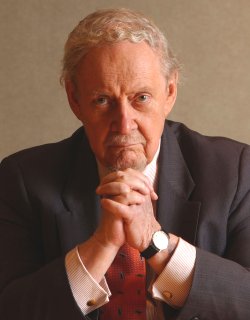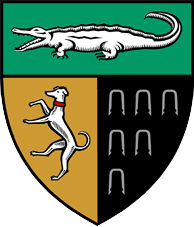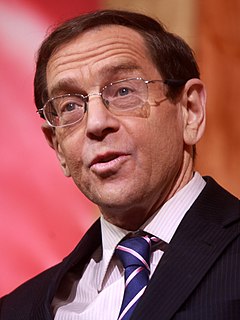Related Research Articles

The American Enterprise Institute for Public Policy Research, known simply as the American Enterprise Institute (AEI), is a right-leaning Washington, D.C.–based think tank that researches government, politics, economics, and social welfare. AEI is an independent nonprofit organization supported primarily by contributions from foundations, corporations, and individuals. Founded in 1938, AEI is commonly associated with conservatism and neoconservatism but does not support political candidates. AEI advocates in favor of private enterprise, limited government, and democratic capitalism.

Robert Heron Bork was an American judge, government official, and legal scholar who served as the Solicitor General of the United States from 1973 to 1977. A professor at Yale Law School by occupation, he later served as a judge on the influential U.S. Court of Appeals for the D.C. Circuit from 1982 to 1988. In 1987, President Ronald Reagan nominated Bork to the U.S. Supreme Court, but the U.S. Senate rejected his nomination after a highly publicized confirmation hearing.

The Federalist Society for Law and Public Policy Studies, most frequently called the Federalist Society, is an organization of conservatives and libertarians that advocates for a textualist and originalist interpretation of the United States Constitution. It features a student division, a lawyers division, and a faculty division. The society currently has chapters at more than 200 American law schools. The lawyers division comprises more than 70,000 practicing attorneys in ninety cities. The society is headquartered in Washington, D.C. Through speaking events, lectures, and other activities, it provides a forum for legal experts of opposing views to interact with members of the legal profession, the judiciary, and the legal academy. It is one of the United States' most influential legal organizations.
The Heritage Foundation is an American conservative think tank based in Washington, D.C., primarily geared towards public policy. The foundation took a leading role in the conservative movement during the presidency of Ronald Reagan, whose policies were taken from Heritage's policy study Mandate for Leadership. Since then, The Heritage Foundation has continued to have a significant influence in U.S. public policy making, and is considered to be one of the most influential conservative public policy organizations in the United States.

Lewis Franklin Powell Jr. was an American lawyer and jurist who served as an Associate Justice of the Supreme Court of the United States from 1971 to 1987. Powell compiled a generally conservative and business-aligned record on the Court.

Yale Law School is the law school of Yale University, located in New Haven, Connecticut. Established in 1824, it has been the top-ranked law school in the United States by U.S. News & World Report every year since the magazine began publishing law school rankings in the 1980s.
Richard Mellon Scaife was an American billionaire, a principal heir to the Mellon banking, oil, and aluminum fortune, and the owner and publisher of the Pittsburgh Tribune-Review. In 2005, Scaife was number 238 on the Forbes 400, with a personal fortune of $1.2 billion. By 2013, Scaife had dropped to number 371 on the listing, with a personal fortune of $1.4 billion.

Alliance for Justice(AFJ) is a progressive judicial advocacy group in the United States. Founded in 1979 by former president Nan Aron, AFJ monitors federal judicial appointments. AFJ represents a coalition of 100 politically liberal groups that have an interest in the federal judiciary. The Alliance for Justice presents a liberal viewpoint on legal issues.

New York University School of Law is the professional graduate law school of New York University. Established in 1835, it is the oldest law school in New York City and the oldest surviving law school in New York State. Located in Greenwich Village in Lower Manhattan, NYU Law offers J.D., LL.M., and J.S.D. degrees in law.

Robert Peter George is an American legal scholar, political philosopher, and public intellectual who serves as the sixth McCormick Professor of Jurisprudence and Director of the James Madison Program in American Ideals and Institutions at Princeton University. He lectures on constitutional interpretation, civil liberties, philosophy of law, and political philosophy. A Catholic, George is considered one of the country's leading conservative intellectuals.
The Landmark Legal Foundation is an American conservative legal advocacy group. The President as of 2018 is Richard P. Hutchison. Through litigation and direct interfacing with government agencies, Landmark Legal advances a conservative platform of limited government and has litigated a number of cases up to and before the US Supreme Court.

Christopher C. DeMuth is an American lawyer and a distinguished fellow at the Hudson Institute. He was the president of the American Enterprise Institute (AEI), a conservative think tank, from 1986 to 2008. DeMuth is widely credited with reviving AEI's fortunes after its near-bankruptcy in 1986 and leading the institute to new levels of influence and growth. Before joining AEI, DeMuth worked on regulatory issues in the Ronald Reagan administration.

Bruce Fein is an American lawyer who specializes in constitutional and international law. Fein has written numerous articles on constitutional issues for The Washington Times, Slate.com, The New York Times, The Huffington Post and Legal Times, and is active on civil liberties issues. He has worked for the American Enterprise Institute and the Heritage Foundation, both conservative think tanks, as an analyst and commentator.
Henry Nodle Butler is an American professor of law, economics, and public policy, the former executive director of the Law & Economics Center at the Antonin Scalia Law School in Arlington, Virginia. On April 22, 2015, Daniel D. Polsby sent an email to alumni announcing that Butler would be replacing Polsby as dean of the law school, effective June 25, 2015.
William J. Baroody Jr. was an American government official best known for running the White House Office of Public Liaison under President Gerald Ford and, later, the American Enterprise Institute (AEI). His leadership of the think tank saw AEI enjoy new levels of political influence but was cut short by financial problems.
David Stern is Executive Director of Equal Justice Works, a national nonprofit organization based in Washington, DC working to create a just society by mobilizing the next generation of lawyers committed to equal justice. He is former president of the Stern Family Fund, a private foundation that supported policy-oriented government and corporate accountability projects.

David Boris Rivkin, Jr. is an American attorney, political writer, and conservative media commentator on matters of constitutional and international law, as well as foreign and defense policy. Rivkin has gained national recognition as a representative of conservative viewpoints, frequently testifying before congressional committees, and appearing as an analyst and commentator on a variety of television and radio stations. He is a Visiting Fellow at the Center for the National Interest, and a recipient of the U.S. Naval Proceedings Annual Alfred Thayer Mahan Award for the best maritime affairs article. He is a fellow at the Foundation for Defense of Democracies, and is a former member of the Sub-Commission on the Promotion and Protection of Human Rights of the United Nations Commission on Human Rights.
Established in 1977, Atlantic Legal Foundation is a nonprofit, nonpartisan public interest law firm with a history of advocating for individual liberty, free enterprise, property rights, limited and efficient government, sound science in the courtroom, and school choice. Atlantic Legal provides legal representation, without fee, to individuals, corporations, trade associations, parents, scientists and educators. The Foundation frequently files amicus curiae briefs in high-profile court cases before state supreme courts, federal circuit courts, and the United States Supreme Court.

The Indiana University Maurer School of Law is located on the campus of Indiana University in Bloomington, Indiana. The school is named after Michael S. "Mickey" Maurer, an Indianapolis businessman and 1967 alumnus who donated $35 million in 2008. From its founding in 1842 until Maurer's donation, the school was known as the Indiana University School of Law – Bloomington.
A cause lawyer, also known as a public interest lawyer or social lawyer, is a lawyer dedicated to the usage of law for the promotion of social change to address a cause. Cause lawyering is commonly described as a practice of "lawyering for the good" or using law to empower members of the weaker layers of society. It may or may not be performed pro bono. Cause lawyering is frequently practiced by individual lawyers or lawyers employed by associations that aim to supply a public service to complement state-provided legal aid.
References
- ↑ official site Archived November 15, 2007, at the Wayback Machine
- 1 2 3 "Center for Corporate Policy". Archived from the original on 2016-03-03. Retrieved 2007-11-16.
- ↑ Ernest B. Hueter Archived September 28, 2011, at the Wayback Machine , Atlantic Legal Foundation
- ↑ Clegg, Roger (2005-09-12). "Response to Alliance For Justice". National Review Online. Archived from the original on 2013-01-29.
- 1 2 3 Margolick, David (September 21, 1990). "When the Public Interest Becomes the Interest of The Corporate World". The New York Times.
- ↑ Why big business hearts John Roberts Archived November 5, 2007, at the Wayback Machine , Michael Scherer, Salon.com, August 11, 2005
- ↑ Rosen, Jeffrey (April 17, 2005). "The Unregulated Offensive". The New York Times.
- ↑ "AEI and National Legal Center for the Public Interest Establish New Research Center on Legal and Constitutional Issues" (Press release). American Enterprise Institute. 2007-09-04. Archived from the original on 2007-11-13. Retrieved 2007-11-07.